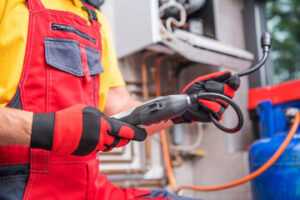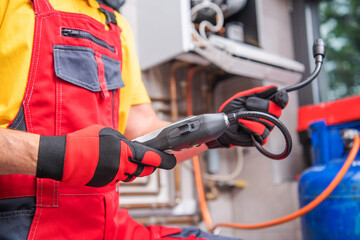Leak detection is a process that helps to identify leaks in pipes and containers. It is essential for businesses that manufacture, store, or transport materials to use this technology to prevent costly damages and losses.

Some obvious signs of a leak include water gushing from a pipe, random puddles, or an increased water bill. However, there are some sneaky signs that you may not be able to spot. Contact Leak Ops LLC for professional help.
Detecting leaks is an important part of ensuring that industrial and commercial systems run properly. It can also help prevent environmental damage and loss of product or materials. Leak detection methods can range from simple techniques like checking for puddles and damp spots to more sophisticated technology. The type of equipment used will depend on the kind of leak being detected and the industry in which the company operates.
Water leaking from pipes can cause serious damage to property and health. This is why it’s important to act quickly if you think you have a water leak. The first step is to turn off your water supply. This can usually be done by turning off the main water valve in your home or business. If you are not sure where the water valve is located, contact your local utility company for assistance. Once you have turned off the water, it’s a good idea to check around your property for any signs of a leak. Wet or swollen areas in the garden, unexplained water stains on ceilings and walls, or musty smells are all signs of a possible leak. If you cannot find the source of the leak, it’s a good idea to call in a professional plumber who will be able to use specialized tools to locate the leak and deal with it.
Acoustic leak detection is a type of sound-based technology that can pinpoint the location of a leak in pressurized pipes. When a leak occurs in a pipe, it creates a sound wave that can be picked up by a sensitive transducer. This signal is then passed to a technician who can hear the noise and locate the source of the leak. This method is particularly useful when there is little ambient noise as it can pick up acoustic signals from very small leaks.
Another option for detecting a leak is to use a flame ionization detector (FID). This instrument works by sending an electric current through the pipe and measuring the ions that are created. If there is a leak in the pipe, the ions will move faster than normal and cause the machine to register an increase in sensitivity.
Detecting a Water Leak
Leaky pipes can be one of the biggest culprits when it comes to water waste and damage. According to a recent study, an average household loses around 17 gallons of water each day due to leaks in plumbing fixtures and fittings such as faucets and shower heads. Detecting these sneaky leaks early can help homeowners save money and prevent major water damage to their homes.
Some signs of a leak are easy to spot such as damp patches or musty smells in and around rooms where water use appliances like boilers, toilets, taps and baths are located. However, many water leaks go unnoticed and can cause serious problems such as mould, damaged ceilings and floors, flooding and even structural damage to a building.
Often these hidden leaks can be difficult to find and require professional detection equipment such as infrared cameras which are designed specifically for this purpose. In addition to this, drones have also become a popular tool for leak detection as they are able to scan large areas quickly and accurately from the air, exposing temperature changes that may indicate a leak.
Another good way to check for a leak is to make sure all the water use appliances in your home are switched off and then read your water meter (please note this should only be done when no one is using water inside or outside your home). Wait about an hour and then come back and repeat the process, if the dials have moved this suggests there is a leak somewhere in your home and you need to call in a plumber.
Other more obvious signs of a leak can be found by looking for any unexplained damp spots in or around your home, especially in areas where there are usually no pipes such as under sinks, behind toilets and other hard to reach places. You should also look for any puddles in your garden and pay particular attention to the area surrounding your outdoor water use devices such as your swimming pool, fountain or hot tub.
If you have noticed any of these warning signs or are concerned that your home is suffering from a hidden leak contact HELP plumbing, heating, cooling and drains today to schedule a professional leak detection service. We can identify and repair leaks anywhere in your plumbing system so that you don’t experience costly water damage or overflows.
Detecting a Gas Leak
Natural gas is an odourless, colourless fuel source that provides heat and power for appliances in homes and businesses. This fossil fuel comes from deposits of methane and other hydrocarbons beneath the earth’s surface and is pumped through pipes to be used as a source of energy in homes. These pipes can be subjected to corrosion and wear over time, and as a result, leaks may occur. Regular yearly maintenance can help prevent these leaks by checking the integrity of all parts and connections. When a leak does occur, it’s important to know the warning signs and what to do about them.
If you suspect a gas leak, evacuate your home and get to a safe location as quickly as possible. Call 911 or your gas company’s emergency hotline. Do not turn any electric switches off or on, or use any tools, as this could ignite the leak and create an explosion or fire. A certified inspector will be able to locate and repair the leak and let you know when it is safe to return.
A common sign of a gas leak is the smell of rotten eggs or sulfur. If you notice a strange smell, you should open windows and doors and leave the house. If the odor is faint, you can try a simple DIY test to determine the source of the leak. Pour a small amount of soapy water into any gas connection points and watch for bubbles to form, the location of the leak can then be determined.
Other signs of a leak include dead plants inside and outside your home, wilted grass, dirt blowing in the air and whistling or hissing sounds. You may also notice a consistent, higher than normal gas bill as gas is being forced through the leaky line versus reaching your appliances.
A gas leak can impact your health, causing headaches, dizziness, nausea and breathing difficulties. In extreme cases, exposure to gas can cause unconsciousness or death. If you notice any unexplained symptoms, it’s critical to evacuate your home and contact a plumber immediately for assistance.
Detecting a Electrical Leak
An electrical leak is a dangerous situation. It means that electricity is flowing through wires or appliances that it shouldn’t be, and it can cause shocks. This type of leak is often caused by old or damaged wiring, or by appliances that are not working properly. It can also happen when the power cable runs through a wall or floor, and is exposed to moisture. If you have an electrical leak, it is important to act quickly to prevent further damage and protect your family’s safety.
The best way to detect an electrical leak is to use a special device called a leakage current clamp meter. This instrument measures the current that flows through a conductor, and it can detect even small leakage currents that might otherwise go undetected by other measuring instruments. It can measure the current in a single live conductor, paired neutral and phase conductors, or all three.
A leakage current clamp meter works by using a specialized sensor that is placed around the conductor in question. It then reads the magnetic field created by that conductor, and it measures the resulting current. This measurement is then used to identify the source of the leakage current. In order to get the most accurate reading, it is important to position the sensors correctly. This is especially true when detecting leakage current in concrete or batten bars.
Another option for detecting an electrical leak is to check your energy bill. If your electric bills are higher than usual without any changes in usage, it could indicate that there is a leak somewhere in your home. If you suspect that there is a problem, contact an electrician right away.
In addition to being a health risk, an electrical leak can also be a financial hazard. If you have an electrical leak, it will cost you more money because your appliances will be using more power than they should. To prevent this, be sure to install electrical insulation sheets in your house, and have a licensed electrician inspect your residual current devices, ground fault circuit interrupters, and circuit breakers regularly.
